I’ve Heard of Macular Degeneration – What Is It?
Many people have heard of the eye disease called Macular Degeneration. Also known by its abbreviation AMD, Age-Related Macular Degeneration is one the leading causes of vision loss in people ages 60 and older. The prefix “Age-Related” is important – macular degeneration very rarely occurs in anyone under the age of 60.
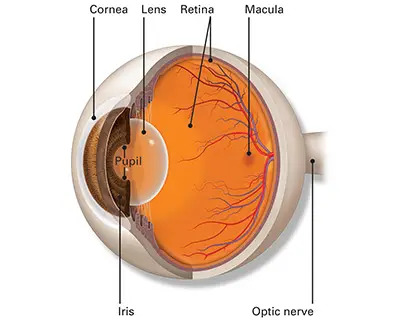
To better understand what AMD is, let’s first talk about the anatomy of our eyes. Now, envision your eyes divided into 3 parts – the front, the middle, and the back. We are all born with a clear lens at the very front of our eyeball which allows light to enter. The middle part of our eye is filled with a jelly-like substance called the vitreous humor, and the very back of our eye is called the retina. The retina itself is a light-sensitive tissue lining the back of our eye that enables vision. If you compare our eye to a tennis ball, the vitreous humor would be the air inside of the tennis ball, and the retina would be the interior rubber lining of the tennis ball on the interior of the neon yellow felt.
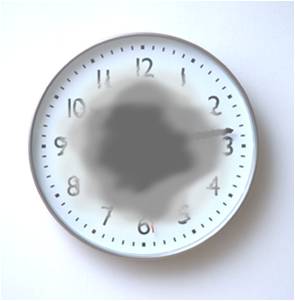 Macular Degeneration is the deterioration of the central part of the retina. Another name for our central retina is the “macula.” The macula itself is an anatomical landmark right in the center of our eyes (just like the knee is a specific location on our leg, the macula is a specific location in our eyes!). The macula is only about 5 millimeters in diameter, but it processes all of our central vision. The very, very center of the macula is called the fovea. The fovea is 1 millimeter in diameter and is responsible for our ability to read, drive, and perform other intricate visual tasks.
Macular Degeneration is the deterioration of the central part of the retina. Another name for our central retina is the “macula.” The macula itself is an anatomical landmark right in the center of our eyes (just like the knee is a specific location on our leg, the macula is a specific location in our eyes!). The macula is only about 5 millimeters in diameter, but it processes all of our central vision. The very, very center of the macula is called the fovea. The fovea is 1 millimeter in diameter and is responsible for our ability to read, drive, and perform other intricate visual tasks.
In macular degeneration, the macula begins to deteriorate and cause gradual central vision changes. Peripheral vision typically continues to remain intact. The macula itself is composed of photoreceptor cells that convert light into vision. When AMD damages these sensitive photoreceptor cells, it causes continued degradation of the vision.
Two Types of Macular Degeneration: Dry AMD and Wet AMD
DRY AMD
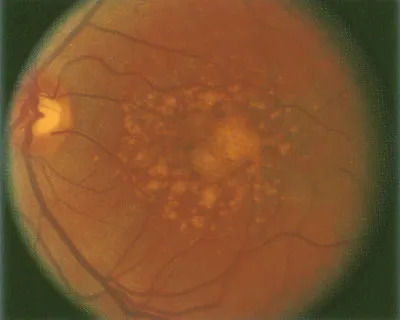
Dry AMD is more common, affecting anywhere from 80-90% of patients that have AMD. Dry AMD is characterized by small bumps in your retina called ‘drusen’. These drusen are yellow deposits full of lipids and proteins leftover from the metabolism of vision that have collected in the retina. These bumps in our retina distort our vision and the underlying photoreceptor cells.
WET AMD
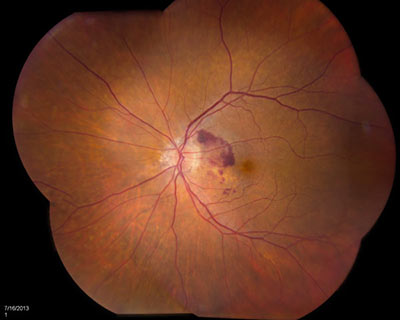
Wet AMD is less common, affecting only about 10% of patients. In Wet AMD, new, bad blood vessels begin to form in our macula and leak fluid into the retina. This excess fluid in our retina causes distortions in our vision. If left untreated, this fluid can form scars which can lead to blind spots in our vision, risking permanent central vision loss.
The size and amount of drusen in your eyes characterizes the severity of your AMD. There are three stages: early stage, intermediate stage, and advanced stage. As the drusen grow in size or severity, the AMD will progress to more advanced stages.
What Causes Macular Degeneration?
There are a variety of factors that put someone at an increased risk of developing AMD. The two most common risk factors are age and genetics. If you have a family history of macular degeneration, you are at an increased risk of developing AMD. Additionally, it has been noted that smoking increases your risk of developing macular degeneration. Stopping smoking is the main modifiable risk factor and smoking cessation is strongly encouraged.
Other risk factors for developing macular degeneration include:
- Excessive sun exposure or lack of UV protection.
- Caucasian or European ancestry. Studies have shown that AMD develops more often in these ethnicities as compared to others.
- Other Medical Comorbidities: Hypertension, Diabetes and Obesity.
- Gender: Female. Women are more likely to develop AMD than men (though, both genders are still affected!).
- Diet: Poor Nutrition. Patients that eat diets lacking in antioxidant and vitamin-enriched foods such as fruits and dark, leafy-green vegetables are more likely to develop AMD.
Symptoms of Macular Degeneration
In both forms of AMD, patients will experience a progressive decrease in central vision. This blurry or distorted vision is constant – it does not oscillate throughout the day, but instead is always present. You may first notice a change in your vision when you are reading your favorite book, or driving down a street – both tasks that typically require detailed, central vision.
Dry AMD – Trouble recognizing contrast or decreased ability to see in the dark, such as at night.
Wet AMD – Missing words in a sentence, seeing straight lines as wavy, or seeing central blurriness when looking closely at a picture or photograph.
How Do You Diagnose Macular Degeneration?
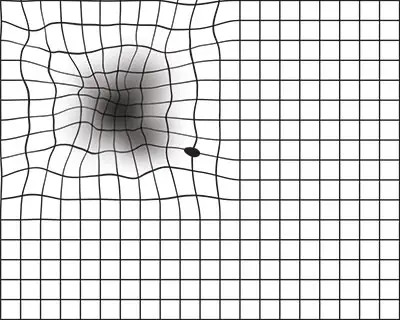
If you are experiencing any symptoms of AMD, it is important to seek a prompt dilated eye exam with an ophthalmologist. Many times, there are very early signs of AMD that your retina specialist could recognize at a biannual or yearly eye exam, but which you would not recognize in your vision. Early detection and diagnosis are crucial in slowing AMD progression.
Treatment of Macular Degeneration
The treatment for AMD depends on which type you have – Wet or Dry. A common treatment plan for both includes lifestyle modifications, such as changing your diet. We recommend eating dark, leafy-green vegetables, such as kale, spinach and broccoli. It is also recommended to increase your intake of foods rich in healthy, unsaturated fats, like olive oil, as well as foods rich in omega-3 fatty acids, such as fish and walnuts.
Wet AMD Treatment: Eye Injections
If you are suffering from Wet AMD, your medical provider may recommend injections of medication into the eye. As mentioned earlier, in Wet AMD, bad blood vessels cause fluid to leak into the retina. The medication contains a molecule called ‘anti-VEGF’ that works to remove the fluid. VEGF stands for Vascular Endothelial Growth Factor and is a signaling molecule in our body that tells our body to promote the growth of new blood vessels. When the medication anti-VEGF is injected, we attempt to reverse this signal and stop the blood vessels from leaking.
Patients who receive these injections usually need them over longer periods of time as the medication wears off with a couple months. That’s why you may hear of friends or family who receive eye injections on a continued interval.
Dry AMD Treatment: Eye Vitamins
A clinical trial research study conducted by the National Eye Institute titled Age-Related Eye Disease Study 2 (also known as AREDS2) concluded that oral supplementation of specific dosages of vitamins and minerals can help slow the progression of macular degeneration.
An eye vitamin, called AREDS2, is sold over-the-counter. If you have AMD, it is recommended you take this vitamin twice per day. It includes a specific dosage of Vitamin C, Vitamin E, Lutein, Zeaxanthin, Zinc, and Copper, that was shown to slow the progression of Dry AMD.
It is important to note that the AREDS2 study was only shown to slow the progression, not to reverse AMD. Furthermore, the vitamins were only demonstrated to work in patients who had an active Dry AMD diagnosis, not for patients that have a family history of AMD. These vitamins were not shown to prevent getting AMD.
An exciting new treatment has come available for dry macular degeneration in 2023. Syfovre is a medication that blocks complement, a source of immune-related damage in the eye. By blocking complement, Syfovre slows the enlargement of blind spots in the central vision. This medication, and others of the same class, will help to preserve reading and driving vision in patients experiencing advanced dry macular degeneration.
AMD Outlook
Many patients who receive a new macular degeneration diagnosis are often very concerned that they will go totally blind. AMD rarely progresses to this, and even in severe cases of AMD, peripheral vision typically remains intact. It takes on average about 10 years to lose vision with AMD. With proper diagnosis and treatment, however, we can combat any vision loss from occurring beforehand.
Please consult a physician with regards to driving or operating machinery if you have AMD as it can sometimes become unsafe to do so, or your vision may not meet legal driving requirements.
Next Steps – Contact us Today!
If you are experiencing any of the above symptoms, please contact our office in Venice, Florida today! Dr. Anita Shane is a macular degeneration specialist trained at the top eye program in America, the Bascom Palmer Eye Institute. She will ensure that you receive the proper treatment to fit your needs.
If you have a family history of AMD or are at a higher risk of developing AMD, please do not delay in receiving a dilated eye examination. Early diagnosis and treatment are very important in managing macular degeneration. Our office is available to address any questions or concerns – please contact us today!
